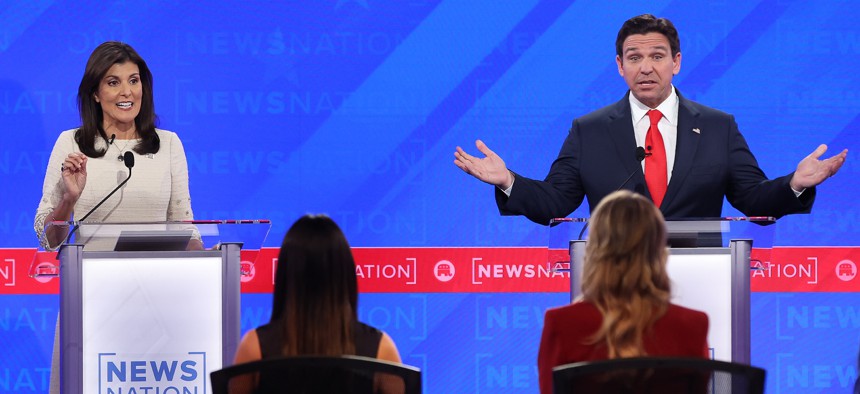
While former President Trump has advocating for the revival of Schedule F, so have Republican presidential candidates former U.N. Ambassador Nikki Haley and Florida Gov. Ron DeSantis. Justin Sullivan / Getty Images
Keeping an eye on Schedule F and other proposals to reform federal workforce and pay protections
COMMENTARY | Former President Trump's plan to convert large swaths of federal employees into "at-will" workers may be on ice for now, but he and other GOP contenders have proposed to revive the proposal or institute a more drastic one.
The holidays are just about here, and counting blessings is in order. U.S. government employees still have it pretty good. Fed pay is headed for an average 5.2% boost next year, and job protections, paths to advancement and merit principles all remain enshrined under longstanding federal law.
But that could all change.
Feds, contractors and everyone who works in—or writes about—the federal community is sharply aware of at least one unwelcome wild card issue that looms along with the prospect of a second Trump presidency: his repeated promise to revive the proposed Schedule F.
In the fall of 2020, then-President Donald Trump issued Executive Order 13597, launching sweeping action to gut job protections for tens of thousands of rank-and-file, General Schedule federal employees.
If implemented, the order would have turned huge swaths of government professionals into easy-to-fire, “at-will” employees. Instead, Trump was voted out, and so too disappeared, for the moment, the immediate threat of removing the legal wall separating operations of the federal workplace from politics.
Last year, the Government Accountability Office issued a report detailing some of Schedule F’s likely negative impacts. The news since is that the Office of Personnel Management has taken steps under existing law to strengthen regulatory protections against similar future executive attempts to weaken merit principles, along with appeals rights and the pay and benefits security—steps that federal unions are backing.
Yet, if you are tracking the current presidential race, Trump presses on in favor of Schedule F—as noted in his recent speeches and website. And mirroring the 45th president, other contenders for the Republican ticket also back gutting federal workforce protections—and pay and benefits security—in much the same way.
Florida Gov. Ron DeSantis flat-out supports reviving Schedule F. And former South Carolina Gov. Nikki Haley recently went further, advocating a kind of Schedule F-plus, the “Freedom Plan,” capping federal employees to a five-year stint in any one position.
“Under my plan, we won’t just have term limits for politicians. We will limit bureaucrats too,” the candidate posted this fall. “No bureaucrat should hold the same position for more than five years.”
Some policy watchers, such as New York Magazine’s Ed Kilgore and The Washington Post’s Catherine Rampell, drub Haley’s plan as even more undermining of the hundred-plus year-old GS-system merit system protections than the MAGA version.
Despite the clamor among GOP candidates to out-primary the former president by running even colder on federal civil servants, some experts see that possibility—at least for now—as remote.
“We have a civil service system which has been developed and codified over a very long time, by way of Congress and legislation,” Ken Warren, a political scientist and administrative law professor at Saint Louis University, told Government Executive. “Employees and that system itself are protected under those laws. A president can’t just come in, issue an executive order, and chuck all those laws.”
Most federal employees have 30 days to appeal. They can take their case either to the Merit Systems Protection Board or federal courts, depending on the case. These mechanisms, though criticized as weighted toward management and still catching up from terrible backlogs in recent years, protect merit principles and prevent many groundless firings and accompanying loss of pay and benefits.
Still, the bottom line for feds mindful about maintaining job protections—and a workplace protected by law from partisan politics: Do your research and delve a little deeper into each candidate’s proposals for the future—your future—of pay, benefits and job protections for the government workforce.
NEXT STORY: 5 highlights of the 2024 Open Season






